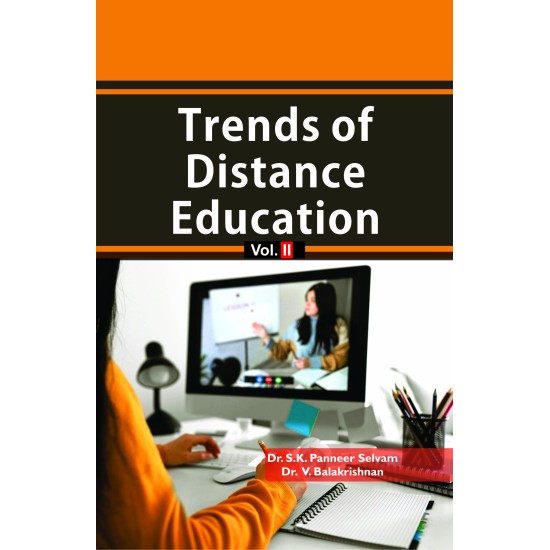Trends of Distance Education.Volume 2

- Stock: In Stock
- Model: ISBN- 9789357511537
- ISBN: 9789357511537
| Book Info | |
| Author | Dr. S.K. Panneer Selvam, Dr. V. Balakrishnan |
| Page No | 600 |
| Year | 2025 |
1. Potential Challenges and Strategies of Distance Education in Uzbekistan. 2. Distance Education Challenges and Opportunities .3. A Study of Role of Information, Communication and Technologies.4. ICT Tends Its Access to Distance Education.5. Revisiting Curriculum through CDPS & CSR.6. Work Environment of Teachers in Pondicherry Region.7. Best Practices for Integrating Technology into the Classroom.8. Role of Technology in Education at present scenario.9. Development of Distance Education and the Role of Teaching Learning Process.10. Media Technology trends and Distance Education.11. Blended Learning in the Classroom.12. Innovative Practice of ICT Special reference to Blended Learning.13. Socio-Demographics of Test Anxiety among Open School Learners of Kerala.14. Concept, Ways and Means of Health Education and Health Promotion.15. A Review of Distance Learning Influences on Adult Learners:Advantages and Disadvantages.16. Online Education in Distance Mode.17. Effectiveness of Self Learning Software Package and Academic Achievement in History at the high School Level.18. Education and Society.19. Mobile Learning in Distance Education.20. Blended Learning in Distance Education.21. Role of E-Learning in Distance Education in India.22. Education and Society.23. Supporting Inclusive Practices in Distance Mode through E-learning.24. Impact of CAI on the Achievement of Biology Students at HigherSecondary Level.25. Emotional Intelligence and Academic Achievement among High School Students.26. Curriculum Design in Distance Education: An Integrated Approach.27. Instructional Technology Module in Chemistry at Higher Secondary Level.28. A Roadmap for Language Education through Neurocognitive Strategies 29. E-Learning in Distance Mode.30. Application of Web Based Instruction (WBI) among Teacher Educators.31. Blended Learning in Distance Education.32. Education and Its Role in Societal Change.33. Developing English Language Proficiency among Rural Areas.34. Use of E-Learning in Education.35. Comparative Curriculum in Distance Education.36. Social Interaction and Pro-social Behaviour through Media.37. Gender Inequalities Issues in Education.38. Educational Innovations in Distance Education.39. Role of E - Learning in Distance Education in India.40. Analysis of Distance Education and E-Learning.41. Role and Challenges of E – Governance in Distance Education.42. Effective Communications in Digital Libraries of Distance Education Through.43. School Health Education for National Development:A Sociological Perspective.44. Blended Learning in Distance Education.45. A Bird View of the Program Evaluation Strategies in Distance Education.46. Gender Inequalities Issues in Education.47. Decision Making Skills among College Students Based on Gender.48. Impact of Modern Technologies on Education.49. E- Learning in Distance Mode.50. Health Education for Prospective Teachers.51. Educational Perspectives in Indian Society.52. Explorative Study on Awareness of Smart Board Learning amongD.El.Ed Students of Nagapattinam District.53. Past, Present and Future of Teacher Education.54. Problems and Prospective in Distance Education in India in the 21st Century.55. Role of Distance Education in Society.56. Major Principles for Curriculum Planning..57. Issues Concerning Gender Inequalities in Education.58. Online Professional Development of in-Service Teacher of HigherEducation through Swayam.59. ICT in Modern Education System: A Case Study.60. Awareness of E-Learning among the Higher Secondary School Students.61. Communication Preferences among Distance Education Students.62. Environmental Health Education for Public.63. Innovative Teaching Techniques for Distance Education.64. Miming and Remind: A Web Tool for Teaching and Learning.65. New Technologies Transforming the Classroom.66. ICT Enabled Learning Environments.67. A Study on Emotional Intelligence, Adjustment and Academic Achievement in Relation to their Social Maturity.68. Education and Society in Modern India.69. Gender Inequality in Education.70. Effectiveness of Computer Assisted Instruction program (CAI) in Teaching Astrophysics for the Secondary School Students.71. Educational Innovations in Distance Education.72. E-Learning in Distance Method.73. Women Empowerment through Open and Distance Learning in India.74. ICT in Education: Its Benefits, Difficulties and Organizational Development Issues.75. Innovative Digital Courseware in Distance Learning.76. Mobile Learning Technologies for Teaching and Learning.77. ICT Awareness among Distance Education B.Ed. Students.78. Implications for Education in the Era of Knowledge Societies in Uses of ICT.79. Learning Chemistry at Higher Secondary Level through Technology Assisted Courseware.80. Technological Content Knowledge in Teaching Learning Process.81. Blended Learning in Distance Education: Need and Importance.82. Distance Education in Modern Society.83. Open Educational Resources - Global Challenges to Distance Education in the Present Scenario.84. Open and Distance Learning and its Influence in Higher Education with Reference to Indira Gandhi National Open University.85. E-Learning a Boon for Distance Education.86. Utilizing Web-Based Technology on Distance Education.87. The Significance of MOOCs in the Domain of Distance Education.88. Climate Change and Distance Education.89. Challenges in English Learning and Teaching in Distance Education.90. Health Education.91. Reading Disorder of Children at Various School Levels.92. Utilization of Online Programmes by Secondary Level Teachers in Teaching Learning Process.93. Use of Brain-Based Teaching for Second Language Learning Through Distance Model.94. Computer Skills of National Institute of Open Schooling (NIOS) Diploma in Elementary Education (D.El.Ed) Students.95. The Development of Critical Thinking as Primary Goal of Educational Process.96. Techniques and Methods of Teaching, Learning Process in Pondicherry during the 18th and 19th Century.97. Effective Role of Science Education in the Society.98. ICT Enabled Education in India.99. Blended Learning in Teaching Mathematics.100. Internet Use of Learning in Distance Education.101. Education and Society.102. Educational Innovations in Distance Education.103. Implications for Education Knowledge of Societies in Uses of ICT on Globalization Based on Education.104. Health Education in School.105. Contribution of Education to build a Value based Society.106. Distance Education’ and ‘e-Learning’: Not the same thing.107. Enhancing Life Skills Through Distance Mode.108. ICT Based Classrooms for Teaching and Learning Process.109. ICT Based Education.110. Relationship between Social Skill and School Climate.
| Book Info | |
| Author | Dr. S.K. Panneer Selvam, Dr. V. Balakrishnan |
| Page No | 600 |
| Year | 2025 |
